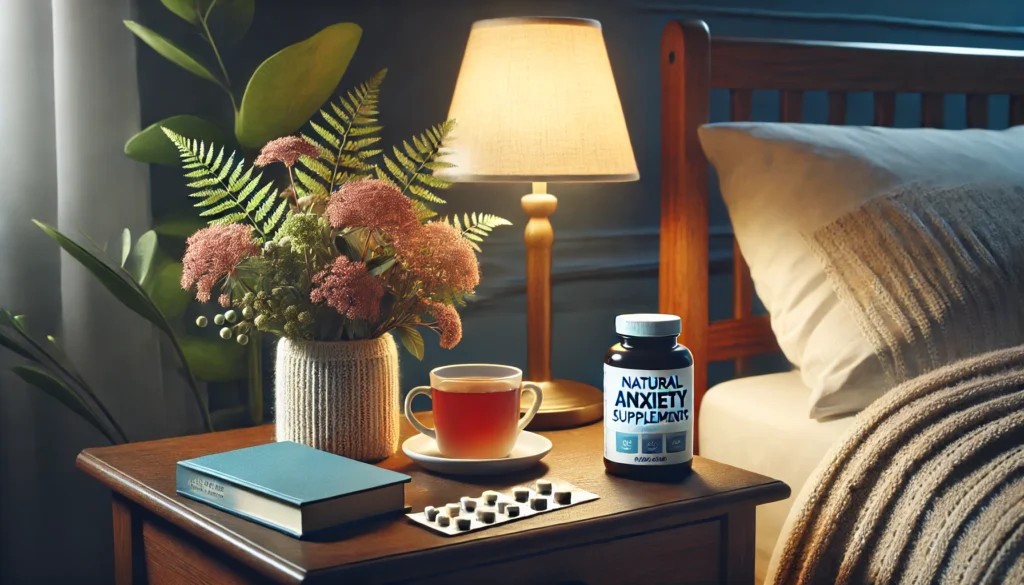When dealing with anxiety, many individuals turn to medications like Lorazepam, a popular benzodiazepine, for relief. However, long-term use of such prescription medications often comes with significant side effects and dependency risks. Fortunately, there are several over-the-counter (OTC) alternatives available for those seeking non-prescription anxiety relief. This article explores these alternatives, providing insights into their efficacy, safety, and usage.
You may also like:Exploring Magnesium and B12 for Anxiety Relief

Understanding Benzodiazepines and Lorazepam
Before delving into alternatives, it’s crucial to understand what benzodiazepines like Lorazepam do. These medications enhance the effect of the neurotransmitter gamma-aminobutyric acid (GABA) in the brain, producing a calming effect that helps reduce anxiety and stress.
How Lorazepam Works
Lorazepam, like other benzodiazepines, operates by binding to specific receptors in the brain that are part of the GABA neurotransmitter system. This binding enhances the neurotransmitter’s natural calming effects. The result is a decrease in the excessive brain activity that leads to anxiety and panic disorders. While effective in acute anxiety situations, the long-term impact on brain chemistry can be concerning.
Side Effects and Risks
Despite their effectiveness, benzodiazepines carry a risk of side effects. Common side effects include drowsiness, dizziness, and fatigue. More severe side effects can include confusion, memory problems, and impaired motor functions. Over time, the body can develop a tolerance, requiring higher doses to achieve the same effect, increasing the risk of dependence and addiction.
Withdrawal and Dependence
One of the significant drawbacks of long-term benzodiazepine use is the potential for withdrawal symptoms upon cessation. These can include rebound anxiety, insomnia, and physical symptoms such as tremors and headaches. The risk of dependence makes it crucial for individuals to explore other anxiety management options, particularly for long-term use.
Why Seek Alternatives?
While effective, benzodiazepines are not without drawbacks. They can lead to dependence, tolerance, and withdrawal symptoms. Moreover, they are not a long-term solution for anxiety management. Therefore, exploring OTC substitutes offers a path to safer anxiety relief without the complications associated with prescription medications.
The Importance of Long-Term Solutions
Benzodiazepines are designed for short-term relief, not prolonged use. Over time, individuals may find themselves in a cycle of reliance that does not address the underlying issues causing anxiety. Long-term solutions focus on managing anxiety sustainably and healthily, reducing the need for pharmaceuticals.
Minimizing Health Risks
Seeking alternatives helps minimize the health risks associated with benzodiazepines. Non-prescription options tend to have fewer side effects and a lower risk of addiction. This makes them a safer choice for individuals looking to manage anxiety without compromising their overall health.
Empowering Personal Health Management
Exploring OTC alternatives empowers individuals to take control of their anxiety management. By understanding and utilizing various tools and techniques, individuals can create a personalized approach that fits their unique needs and circumstances, fostering a greater sense of autonomy and well-being.
Over-the-Counter Substitutes for Lorazepam
Several OTC options are available that can serve as non-prescription substitutes for Lorazepam. These include herbal remedies, dietary supplements, and lifestyle modifications.
Herbal Anxiety Remedies
Herbal remedies have been used for centuries to manage stress and anxiety. Here are some of the most popular ones:
Valerian Root
Known for its sedative properties, valerian root is often used to promote relaxation and improve sleep quality. It works by increasing GABA levels in the brain, similar to benzodiazepines, but without the risk of dependency. Valerian root is available in various forms, such as teas, capsules, and tinctures, making it accessible to those looking for natural anxiety relief.
Passionflower
This herb is believed to boost GABA in the brain and is used to alleviate anxiety and insomnia. Some studies suggest it may be as effective as some prescription medications for anxiety. Passionflower can be consumed as a tea or in capsule form, providing a gentle and natural approach to reducing stress levels and improving sleep quality.
Chamomile
Widely consumed as a tea, chamomile is known for its calming effects. It contains antioxidants that may help reduce inflammation and anxiety. Chamomile’s gentle nature makes it suitable for daily use, and it is often combined with other herbs in teas and supplements to enhance its calming properties.
Dietary Supplements for Anxiety
In addition to herbal remedies, certain dietary supplements can aid in anxiety management:
Omega-3 Fatty Acids
Found in fish oil, these essential fats are known for their brain health benefits. They help reduce inflammation and have been linked to lower anxiety levels. Regular intake of omega-3 supplements can improve overall mood and cognitive function, making them a valuable addition to an anxiety management routine.
Magnesium
A critical mineral for neurological health, magnesium deficiency is associated with increased anxiety. Supplementation may help reduce anxiety symptoms and improve mood. Magnesium is available in various forms, including tablets, powders, and topical applications, providing flexibility in how it is consumed.
L-Theanine
An amino acid found in green tea, L-theanine promotes relaxation without sedation. It is known to enhance alpha brain waves, contributing to a state of calm and focus. L-theanine is available as a supplement and is often combined with caffeine to balance its stimulating effects, providing a focused yet relaxed state.
Other Natural Supplements
In addition to the more well-known supplements, other natural substances like Ashwagandha and 5-HTP have been explored for their calming effects. Ashwagandha, an adaptogen, helps the body manage stress, while 5-HTP, a precursor to serotonin, can improve mood and reduce anxiety. These supplements offer additional options for those looking to manage anxiety through natural means.
FDA-Approved Over-the-Counter Anxiety Medications
Currently, there are no FDA-approved OTC medications specifically for anxiety. However, some antihistamines like diphenhydramine (Benadryl) are used off-label for their sedative effects. It’s crucial to consult a healthcare provider before using antihistamines for anxiety, as they can cause drowsiness and other side effects.
Potential Risks and Considerations
While some OTC medications can help manage anxiety symptoms, it’s essential to be aware of their potential side effects. Sedatives like antihistamines can lead to drowsiness and impaired cognitive function, impacting daily activities. Understanding these risks and consulting a healthcare provider ensures safe use.
The Role of Healthcare Providers
Healthcare providers play a critical role in guiding individuals toward appropriate anxiety management strategies. Consulting with a professional can help determine the best course of action, whether it’s trying an OTC remedy or pursuing other therapeutic options. A healthcare provider can also monitor progress and adjust treatments as necessary.
Exploring Future Options
As research in the field of anxiety management progresses, new OTC options may become available. Staying informed about the latest developments can help individuals make educated choices about their anxiety management strategies, ensuring they have access to the most effective and safe options.

Lifestyle Modifications for Anxiety Relief
Incorporating lifestyle changes can significantly impact anxiety levels and overall well-being.
Mindfulness and Meditation
Practicing mindfulness and meditation can help individuals manage stress and anxiety. These techniques promote a greater awareness of the present moment, reducing negative thought patterns and enhancing relaxation.
Techniques for Mindfulness
Mindfulness can be practiced through various techniques such as deep breathing, body scans, and mindful walking. These practices encourage individuals to focus on the present, reducing anxiety by shifting attention away from worrisome thoughts. Regular mindfulness practice can lead to improved emotional regulation and a greater sense of peace.
Meditation Practices
Meditation involves dedicating time to focus the mind and calm the nervous system. Forms of meditation, such as guided imagery, loving-kindness meditation, and transcendental meditation, provide different approaches to achieving mental tranquility. Consistent meditation practice can help reduce the frequency and intensity of anxiety episodes.
Benefits Beyond Anxiety
Mindfulness and meditation offer benefits beyond anxiety relief. They can improve focus, enhance creativity, and promote better sleep. These practices cultivate a balanced lifestyle that supports overall mental and physical health, making them valuable tools in anxiety management.
Regular Exercise
Exercise is a proven stress reliever. Physical activity increases the production of endorphins, the body’s natural mood elevators. Activities like yoga, walking, or swimming can be particularly beneficial.
Types of Beneficial Exercise
Different types of exercise offer various benefits for anxiety management. Aerobic activities like running and cycling increase heart rate and release endorphins, while yoga and tai chi focus on breathing and mindfulness, promoting relaxation. Finding an enjoyable activity can make regular exercise a sustainable part of an anxiety management plan.
Building an Exercise Routine
Incorporating exercise into daily life can be achieved through small, consistent changes. Setting specific goals, choosing activities that fit individual preferences, and finding a workout buddy can enhance motivation. Over time, these habits can lead to significant improvements in mood and anxiety levels.
Exercise and Mental Health
Beyond anxiety relief, regular exercise contributes to overall mental health. It can improve sleep quality, boost self-esteem, and reduce symptoms of depression. By integrating physical activity into daily routines, individuals can create a holistic approach to managing anxiety and enhancing well-being.
Sleep Hygiene
Quality sleep is essential for mental health. Establishing a regular sleep schedule, creating a relaxing bedtime routine, and limiting screen time before bed can improve sleep quality and reduce anxiety.
Importance of Sleep in Anxiety Management
Adequate sleep is crucial for cognitive function and emotional regulation. Sleep deprivation can exacerbate anxiety symptoms, leading to a cycle of poor sleep and increased stress. Prioritizing sleep hygiene helps break this cycle and supports overall mental health.
Creating a Sleep-Friendly Environment
A conducive sleep environment can significantly impact sleep quality. Keeping the bedroom cool, dark, and quiet, investing in a comfortable mattress, and using calming scents like lavender can promote restful sleep. These changes create a space that encourages relaxation and rejuvenation.
Establishing a Consistent Sleep Routine
Consistency is key to improving sleep hygiene. Going to bed and waking up at the same time daily, even on weekends, helps regulate the body’s internal clock. Incorporating relaxing activities before bed, such as reading or taking a warm bath, can signal the body to wind down, making it easier to fall asleep.
Future Implications and Trends
The exploration of non-prescription anxiety relief is an evolving field. As research continues, new insights into the mechanisms of anxiety and stress may lead to innovative treatments and supplements.
Nootropics and Biohacking
The rise of nootropics and biohacking reflects a growing interest in optimizing mental health through non-traditional means. These approaches often incorporate a combination of dietary supplements, lifestyle changes, and cutting-edge research to enhance cognitive function and emotional well-being.
Understanding Nootropics
Nootropics, often referred to as “smart drugs,” are substances that enhance cognitive functions such as memory, creativity, and motivation. They range from natural substances like Rhodiola Rosea to synthetic compounds. While research is still ongoing, some nootropics have shown promise in reducing anxiety and improving mental clarity.
Biohacking for Mental Health
Biohacking involves making small, incremental changes to diet, lifestyle, and supplementation to improve overall health and performance. Techniques such as intermittent fasting, cold exposure, and personalized nutrition plans are gaining popularity. These methods aim to optimize brain function and emotional resilience, providing new avenues for anxiety management.
Ethical Considerations
As with any emerging trend, nootropics and biohacking come with ethical considerations. The long-term effects and safety of some substances are still under investigation. It’s essential for individuals to approach these methods with caution, seeking guidance from healthcare professionals and relying on evidence-based practices.
Personalized Medicine
Future trends may also include personalized medicine, where treatments are tailored to an individual’s genetic makeup and specific needs. This approach holds the promise of more effective and targeted anxiety management strategies.
The Role of Genetics in Anxiety
Genetic factors play a significant role in an individual’s susceptibility to anxiety. Personalized medicine uses genetic information to tailor interventions, offering the potential for more effective and targeted treatments. Understanding one’s genetic predispositions can lead to better-informed decisions about anxiety management.
Technology and Personalized Care
Advancements in technology, such as genetic testing and AI-driven health assessments, are making personalized medicine more accessible. These tools can provide insights into how an individual might respond to specific treatments, enabling more precise and effective interventions. This approach represents a shift towards more individualized and patient-centered care.
Challenges and Opportunities
While personalized medicine offers exciting possibilities, it also presents challenges such as privacy concerns and the need for comprehensive data. Navigating these challenges requires collaboration between healthcare providers, researchers, and policymakers. As personalized medicine evolves, it holds the potential to revolutionize anxiety management and improve patient outcomes.

Conclusion
While Lorazepam and other benzodiazepines have their place in anxiety management, exploring over-the-counter alternatives offers a safer and potentially more sustainable approach to relief. Whether through herbal remedies, dietary supplements, or lifestyle changes, individuals have a range of options to consider.
Making Informed Choices
As always, it is essential to consult with a healthcare professional before making significant changes to your anxiety management regimen, especially if you are currently on prescription medications. With the right approach, it is possible to manage anxiety effectively without relying on prescription drugs.
Staying Informed
By understanding the options available and staying informed about the latest research and trends, individuals can make empowered choices about their mental health and well-being. Continuous education and awareness are key to navigating the evolving landscape of anxiety management.
Building a Supportive Network
In addition to exploring alternatives, building a supportive network of healthcare providers, friends, and family can enhance anxiety management efforts. Sharing experiences, seeking guidance, and fostering open communication can provide the support needed to navigate the challenges of anxiety and achieve lasting well-being.
Further Reading:
Are There Any Over-The-Counter Anxiety Medications?
Important Note: The information contained in this article is for general informational purposes only, and should not be construed as health or medical advice, nor is it intended to diagnose, prevent, treat, or cure any disease or health condition. Before embarking on any diet, fitness regimen, or program of nutritional supplementation, it is advisable to consult your healthcare professional in order to determine its safety and probable efficacy in terms of your individual state of health.
Regarding Nutritional Supplements Or Other Non-Prescription Health Products: If any nutritional supplements or other non-prescription health products are mentioned in the foregoing article, any claims or statements made about them have not been evaluated by the U.S. Food and Drug Administration, and such nutritional supplements or other health products are not intended to diagnose, treat, cure, or prevent any disease.


